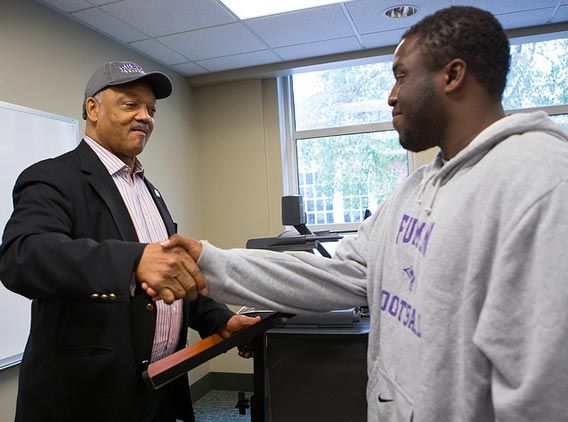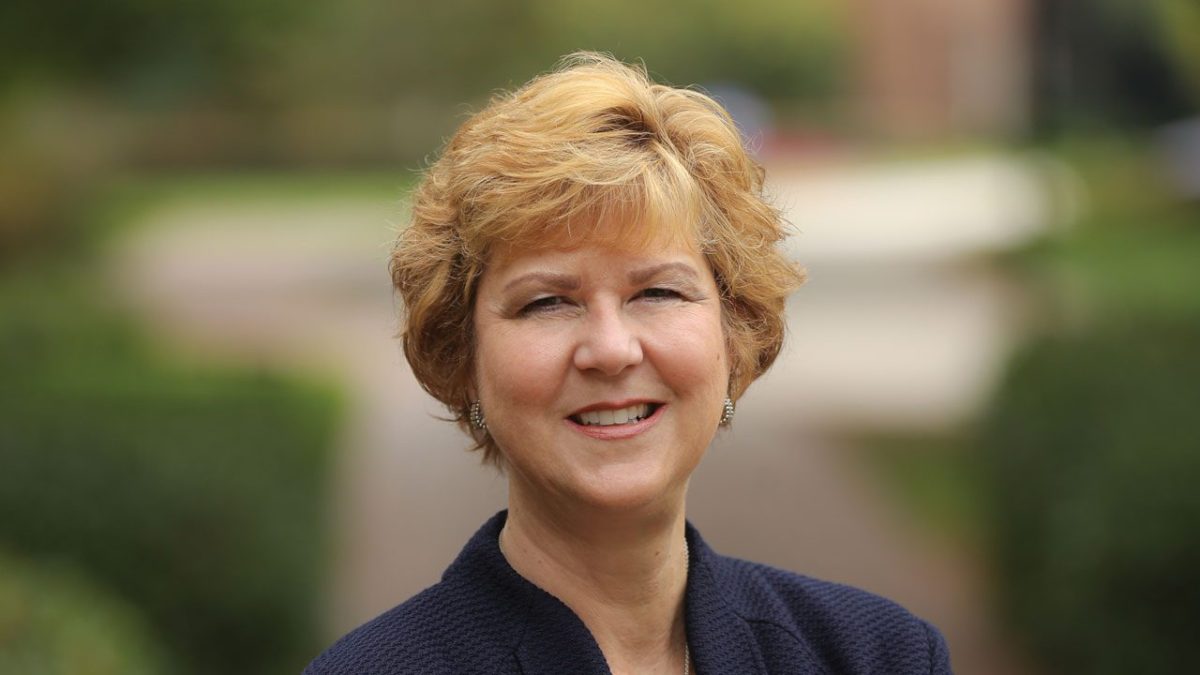By his account, the Rev. Jesse Jackson spent his youth as an ardent fan of Furman University athletics, cheering on the Purple Hurricanes football team and the Paladins basketball team and idolizing the university’s star players.
But when Jackson, a former presidential candidate and prominent civil rights activist once regarded as the successor to Martin Luther King Jr., graduated from Greenville’s Sterling High School in 1959, Furman’s policy of racial segregation prevented him from attending his hometown university, leading him to enroll instead at the University of Illinois.
That experience would serve as the inspiration and backdrop for Jackson’s visit to Furman last week, the centerpiece of which was his address to a full crowd at McAlister Auditorium in commemoration of the 50th anniversary of the civil rights movement.
“Furman University was the school of my dreams,” Jackson said at the start of his speech. “The tragic fact was the we [African-Americans] could not attend Furman University, not even apply at that time.”
In his speech, entitled “Keeping Hope Alive,” Jackson recalled his experiences growing up in Greenville and argued passionately against injustices and divisions that he said persist in American society a half-century after the achievements of the civil rights movement.
“The challenge 50 years later is learning to live together,” he said. “That is not as simple as it sounds. We’ve learned how to not live together. We’ve learned how to survive apart.”
“It means unlearning unfounded fear, unlearning hatred and ignorance and violence, unlearning contempt for the poor, learning to live together.”
Jackson addressed a range of contemporary issues, from the war in Afghanistan to the New York Police Department’s stop and frisk policy. At one point he weighed in on the ongoing controversy over the Washington Redskins’ team name, linking the name to what he identified as America’s history of injustices against the indigenous peoples of the United States.
But Jackson saved perhaps his sharpest criticisms for his home state. He contended that the mass incarceration of Americans, particularly of African-Americans in South Carolina, constitutes a form of modern day slavery benefiting private corporations. He also targeted conservative Palmetto State politicians with strong anti-government philosophies, whom he said had rejected federal funding that would go toward helping South Carolinians living in poverty.
Throughout, Jackson, who is a Baptist minister, drew upon stories from the Bible to underscore his points. He described Jesus as a revolutionary political leader whose message of good news to the poor and oppressed upset the conservative religious leaders of his day.
“He came forth with this revolutionary gospel, born of the wrong occupation, born with a death warrant because his very promise represented the hope of the people who had been down and out, locked down and left out,” Jackson said.
Following his address, Jackson fielded questions from members of the audience. One audience member, who identified herself as a Furman student, challenged Jackson’s pro-life position on abortion, and another asked Jackson for his opinion on the Affordable Care Act, which she said she felt contradicted his ideals.
“The idea that more health insurance makes a nation less healthy, doesn’t seem to me to compute,” Jackson said.
Junior Daniel Hoilett, an elementary education major at Furman, asked Jackson what advice he would give to future educators like himself. In his reply, Jackson emphasized the power of education in the struggle for equality, saying that “strong minds break strong chains.”
Jackson’s visit to Furman came about after he met with history professors Diane Vecchio and Courtney Tollison in September for an interview about the civil rights movement in Greenville. Jackson himself proposed the visit, citing his personal connection to Furman, and several university groups — including the History Department, the Humanities Development Fund Committee, and the Student League for Black Culture — signed on as sponsors.
Tollison, who has studied integration at several South Carolina universities, explained that Furman did not desegregate until six years after Jackson graduated from high school, though President John Plyler had personally looked into the issue as early as the late 1940s.
The primary push to desegregate began in the fall of 1963 when Furman’s Board of Trustees moved to pass a racially non-discriminatory admissions policy. But the South Carolina Baptist Convention, to which Furman was still connected at the time, disapproved of the Board’s actions and asked for a year to study the issue.
“Quite frankly, they weren’t supportive of it,” Tollison said.
In the meantime, Furman’s Vice President Frank Bonner began to prepare for integration, recruiting Joseph Vaughn, a standout student at Greenville’s Sterling High School, to become the university’s first African-American student.
The S.C. Baptist Convention’s general assembly would ultimately vote against desegregation, but in an act of defiance, the Board of Trustees voted in the fall of 1964 to implement the non-discriminatory admissions policy anyway. Vaughn would enroll the first semester of 1965, officially ending racial desegregation at Furman. Furman’s first female African-American student, Lillian Flemming, would enroll a couple years later.
Professor Vecchio sought to contextualize Jackson’s visit with respect to the history of Furman and the South, saying that commemorating the civil rights act allowed the university and Greenville to reflect on the lessons of the past.
“The lessons of history are vital if we act on those history lessons,” she said. “We can’t fall back into neglect. We can’t just assume that things can never happen again.”
“At the same time, I think we also need to celebrate what we’ve accomplished but to be open-minded enough to say, ‘Are there things left unfinished?”
It was a sentiment Jackson echoed in his speech.
“Here we are 50 years later — better but we could become better still,” he said.




























